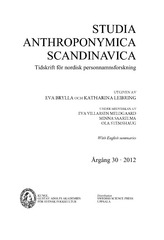Ti år med den norske navneloven
Peer reviewed, Journal article
Published version
Permanent lenke
https://hdl.handle.net/1956/8971Utgivelsesdato
2012Metadata
Vis full innførselSamlinger
Sammendrag
The current Personal Names Act of Norway has been in force since 2003. Inspired by a liberalised cultural ideology, it sought to simplify decision making and to take greater account of the name cultures of immigrant communities and of changing ways of living together (e.g. as unmarried cohabitants). The changes brought more freedom to choose given names from abroad, as well as names that might look strange. Individuals were thus given greater personal responsibility for their own names, and government restrictions on what names could be chosen were relaxed. Examples of names made possible by the new provisions are Tog (‘train’), Gudergod (‘God is good’), and Kolaautomat (‘Coke machine’, i.e. a vending machine selling Coca-Cola). Rules on the use of surnames from one’s own family and from other families became less restrictive. Before 2003, only surnames with 500 bearers or more could be freely chosen; the new law reduced this limit to 201 or more. Surnames could now also be taken from great-grandparents, the former limit within a family having been the grandparents’ surnames before marriage. Patronymics and metronymics were reintroduced as surnames, with a free choice of endings used for this purpose in other cultures. Hyphenated double surnames, which had been forbidden since 1923, were now allowed, primarily to ensure equal treatment of a wife’s and a husband’s family traditions. The naming practices of immigrant cultures were also incorporated in many ways in the new law. An important example of this is the use of the father’s or mother’s first name as a surname for children, based on Muslim tradition. In addition, the possibility of gender- specific endings to surnames was introduced, an east European tradition. Surnames with old-fashioned Norwegian or Danish spellings may now be modernised. The special Norwegian (and Scandinavian) letters æ, ø and å may be replaced with the international spellings ae/a, oe/o and aa/a. The article examines how the new provisions have been applied, and the assessments behind the decisions reached. Since the law was changed, the author has been consulted extensively by Norway’s population register authorities. The present account is based mainly on questions arising from these consultations, and also from the drafting of the law.
